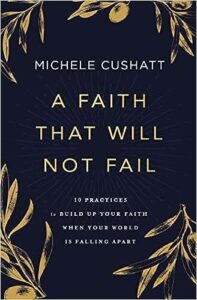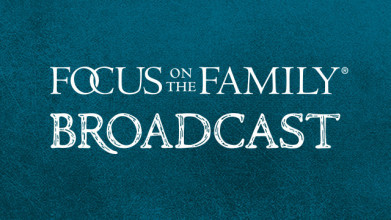Preview:
Michele Cushatt: When the arrest happens in the Garden of Gethsemane, he said, “I prayed that your faith would not fail.” And when I read that, you know, um, and contrasted it with my own life story and life experience, I realized that God was trying to help me see these other things are terrifying. The devil is gonna eat you for lunch. It’s gonna be rough. “But I have prayed for you, and don’t forget that what is most at stake here isn’t your health, it’s not your family. It’s your faith.”
End of Preview
John Fuller: Well, that’s Michele Cushatt, and she’s with us again today on Focus on the Family, and thank you for joining us. Your host is Focus president and author, Jim Daly. And I’m John Fuller.
Jim Daly: John, it’s such a pleasure to have Michele in the studio again today. Uh, she has weathered some major storms in her life, and her faith has been tested probably like a few others.
John: Mm.
Jim: But she has chosen to cling to God, that’s a good way to describe it, and to trust him every step of the way, and it’s inspiring. And I think she would tell you he has carried her through these dark areas. Last time, we discussed the, uh, first few of the 10 practices Michelle has identified to build a stronger lasting faith, lament, humility, relinquishment and contentment. Uh, just really good stuff. And if you missed part one, get in touch with us. Go to the website. You can download it or get the app for your smartphone. Uh, but you should listen. It was really deep and helpful. Today, we’re gonna dive back into those practices and help you get a strong grasp on a faith that will sustain you through difficult times.
John: Mm.
Jim: Who doesn’t need that?
John: Yeah. Yeah, this is encouragement from Michele Cushatt, who is, uh, the mom of six. She’s married to Troy and she writes and speaks. She’s a very busy person and very deep in her faith. Uh, she’s written a terrific book that is really the foundation for our conversation. Uh, it’s called A Faith That Will Not Fail, and, uh, we’ll recommend you get a copy of that from us. The details are at focusonthefamily.com/broadcast, or give us a call, 800, the letter A and the word FAMILY.
Jim: Michele, welcome back.
Michele: Thank you. I’m so glad to be back again. (laughs)
Jim: Yeah, thanks. And, uh, man, for those just joining us that haven’t had a chance to go get the app for the smartphone (laughs) or go to the website-
Michele: Mm-hmm.
Jim: … and listen to part one, just recap medically what happened with you-
Michele: Yes.
Jim: … and the cancer that kept coming back.
Michele: Yeah. So, when I was in my 30s, I was diagnosed with squamous cell carcinoma of the tongue, cancer of the tongue, which, again, I had no idea even existed and I was a very healthy mom, a non-smoker, very active, so there was really… Nobody could explain to me why I had it. And then over the four years following, four or five years following, it came back two more times, and the most significant of which, uh, left me with a permanent functional disability. Uh, they took out two thirds of my tongue, multiple other si- uh, incisions, removal of lymph nodes, my submandibular gland, all of that. But, um-
Jim: Mm.
Michele: … very literally, uh, they had to take me to the brink of death in the hope of maybe saving my life.
Jim: Yeah.
Michele: And it was a yearlong grueling process that took me about two years to come back from. I mean, we’re-
Jim: Yeah.
Michele: It’s hard to even describe.
Jim: To crawl back from probably.
Michele: Yeah. I mean, uh… Yeah. And I- I’m still not even 100%, you know-
Jim: Yeah.
Michele: … several years later.
Jim: But you’ve been cancer free for how many years?
Michele: Oh, gosh. Seven, eight years now.
Jim: Yeah. Isn’t that a-
Michele: Which is amazing.
Jim: … a praise?
Michele: I, I mean, I shouldn’t be here-
Jim: Yeah.
Michele: … and I know that every day.
Jim: Wow. Isn’t that something? Let’s move on to these 10 practices.
Michele: Okay.
Jim: We covered several last time. Uh, the next one in the lineup that I wanted to get to was shalom.
Michele: Mm.
Jim: And that, again, you, you have picked some really interesting practices like last time.
Michele: (laughs). Yes.
Jim: You know, relinquishment and lament, words and practices that we don’t really give much attention to. Shalom is another one. The, you know, the Jewish people understand that.
Michele: Mm-hmm.
Jim: I would say only… And I’ll have you fill in the blanks on this, but, um, you know, I went to Israel with Ray Vander Laan. We’ve done that long series with him over the last 27-
Michele: Mm-hmm.
Jim: … 28 years, That the World May Know. This was probably the most powerful point that I took away from that experience-
Michele: Mm.
Jim: … uh, and that was when sin entered the world, chaos entered the world.
Michele: Mm. Mm-hmm.
Jim: And we see it all around us.
John: Mm.
Jim: Boy, do you see it in foster care-
Michele: Yes.
Jim: … for example. It’s just chaos. And then s- Ray said, “But Jesus came that we would have-
Michele: Mm-hmm.
Jim: … God’s shalom-
Michele: Mm-hmm.
Jim: … and then be able to give it to the world around us.” Poof.
Michele: Yes.
Jim: That’s it.
Michele: A-
Jim: Define shalom, and what is it?
Michele: Well, s- we typically, you know, transliterate shalom as peace, but it’s really much more than peace. We think of peace in our current, um, society, current culture as the absence of struggle and conflict. You know, we take, um, a Tylenol for a headache. We want everybody to stop talking so it’s peaceful, right? So, we’re, we’re thinking of it at a very superficial level. But shalom, Jesus’ shalom is not peace and quiet. It’s actually completeness, wholeness, groundedness.
Jim: Mm.
Michele: I… That sounds so different, doesn’t it?
Jim: Yeah.
Michele: It’s the sense of that, um, as broken and incomplete as I feel, as in progress, the chaos that you talked about, that shalom is an awareness of our wholeness in Christ, nothing missing.
Jim: You know, last time you spoke to the great, uh, story in the Bible where Jesus is asleep on the boat-
Michele: Mm-hmm.
Jim: … and the big storm goes and the disciples are like, “Are you just waiting for us to die?”
Michele: (laughs)
Jim: “How could you be sleeping at a time like this?” That’s my paraphrased version.
Michele: (laughs). I like it.
Jim: And then Jesus wakes up from his sleep and says-
Michele: Mm-hmm.
Jim: … “Where’s your faith?” Right?
Michele: Mm-hmm.
Jim: And we get that, we understand that he understood everything. He’s omniscient.
Michele: Yeah.
Jim: He knows where it’s going. He… But then you go forward to the Garden of Gethsemane-
Michele: Mm-hmm.
Jim: … and he, himself, the son of God, is expressing a little less-
Michele: Mm-hmm.
Jim: … shalom. Like, “Lord, if you could take this cup from me, please. But not my will be done. Your will be done.”
Michele: Yes.
Jim: But the fact that he expressed it should give us some encouragement-
Michele: It’s such a comfort.
Jim: … that if the son of God can express it-
Michele: Yes.
Jim: … we should be able to as well.
Michele: Exactly. A- And that’s so important. I’m glad you pointed that out because I’ve, I’ve heard from… I get emails and messages from people all the time who have been told my leaders in their church or a spouse or a friend that their fear is a lack of faith, that their fear means that they’re not being good Christians. Fear is a normal human response to terrifying emotions, but we need to take that fear to the Jesus who sits in our boat, right?
Jim: Yeah. Mm.
Michele: So, the reality of the fear, Jesus had the f-… That sense of, “Gosh, I’m gonna suffer, and that’s hard, that’s terrifying.” Jesus did not lack faith. He knew God was going to redeem it all through this, this journey. But he had a very human response to suffering, and even the reality that he knew God was gonna have to separate himself from him, right?
Jim: Yeah.
Michele: But he endured the separateness from God so we would never be separated from God.
Jim: Yeah.
Michele: That’s the key.
Jim: I- In the book, you, you describe how to practice shalom and you used-
Michele: Mm.
Jim: … a very specific connection to your cancer treatment. Wh- What did you do to practice shalom as you’re getting your treatment?
Michele: Well, shalom is not only individual, but it’s communal, corporate, right? We don’t experience wholeness in- individually only. Wh- Shalom comes as we’re in relationship with one another. There’s something that God creates… Like the trinity, right?
Jim: Right.
Michele: He operates in a trinity. There’s a wholeness of the Father, the Son, the Holy Spirit. Well, we are created the same. So, we have shalom with God, completeness, but it also is fully realized in relationship with others. So, as I was going through radiation, uh, and they did really intense radiation on my head and neck and, you know, I’ll spare you the gory details, but when you start shooting radiation at the face, it has pretty significant-
Jim: It burned you.
Michele: Oh, I was… Yes.
Jim: It burned you.
Michele: Like, I still have scars, burns scars o- from my nose to my chest from radiation-
Jim: Yeah.
Michele: … uh, on the inside and out. So, it was significant. And I had to go through 28 or 30 of those treatments, if you can imagine.
Jim: The pain.
Michele: Uh, and they would have to bolt my head down to the table to do the radiation, so I couldn’t move. I was bolted to the table, knowing that I was being burned. So, you can imagine, very traumatic. Um, trying to find shalom in that place is not easy, and so every day, um, I, you know, felt prompted by the Holy Spirit to read the Book of John, one chapter a day, as well as first, second, third John, and it was exactly the number of treatments. And then after I would read a chapter in the Book of John, I would write one person’s name on an index card, somebody who I knew was suffering.
Jim: Mm.
Michele: And I would take that index card, I would keep it in my left hand with their single name on it, and I would lay it on my leg, and as I was bolted to the table getting these treatments, I would pray for that person on the card. And all of a sudden, my individual suffering became a way for us to participate in the suffering of each other and experience the wholeness of God’s presence, that we’re all together in this and God holds all of us.
I, uh… It’s hard to even describe, but something kind of other worldly, you know, just beautiful happened in this place of horrific pain that helped me to know, one, I’m not alone, but I can still, even at this place, reach into the suffering of somebody else and we can experience something of God there.
Jim: Yeah. You know, um, it ministers to me to hear this. Jean and I, you know… She’s had two deaths of siblings in her family-
Michele: Mm.
Jim: … and it’s been really rough.
Michele: Mm-hmm.
Jim: A lot of grief. And I remember, you know, trying to encourage her, ’cause given my background, I’m kind of, “Look forward, pick yourself up-
Michele: Mm.
Jim: … by your bootstraps. Let’s go. What, what choice do you have? So, you might as well kind of just move forward.” And she was so good at saying, “Jim, not everybody’s wired like that.”
Michele: Yeah. It’s so-
Jim: “I need to sit here and grieve.”
Michele: Mm-hmm.
Jim: “Can you do it with me?”
Michele: Mm-hmm.
Jim: And that was a big challenge for me ’cause I, I don’t do that well, to just stop and go, “Okay. I need to grieve this.” I’d rather sweep it under the carpet-
Michele: Uh-huh.
Jim: … and just kind of joyfully keep going down the road.
John: Mm.
Jim: Speak to that contrast and, for those of us that want to be happy-go-lucky kind of in our attitude because we think that’s deeply spiritual, what we’re missing when we don’t stop to grieve.
Michele: Oh, the whole story of the Gospel is the story of, um, humanity experiencing a disconnecting relationship and God determining to redeem that relationship by connecting, right? That’s the whole message is that God, he could have just moved forward, too, right?
Jim: Yeah.
Michele: “Oh, just move forward. Deal with it.” And he stopped and through Emmanuel, God with us sent, uh, him to enter into our human experience in the pit that we’re in, okay?
Jim: Mm.
Michele: Um, a- as a mom of foster adoptive kids with a history of trauma, I know, you know, the science of research says the biggest indicator of adult health from a child who has early childhood abuse and neglect, it’s the presence of one stable significant other-
Jim: Mm.
Michele: … willing to enter into it with them. Well, that’s exactly the Gospel message, right?
Jim: Exactly.
Michele: Right? So, I look at Jesus’ model of that, for those who want to just move forward. Uh, you know, the cross, I keep coming back to this, but it really is all summed up into that, Jesus entered into our suffering. He didn’t say, “Pick yourself up by the bootstraps and get your act together. I’ve saved the world. Come, you know, be… You, you should be fine.” He entered into the suffering with us and he suffered so we would know we are not alone in our suffering, right?
Jim: Mm.
Michele: So, if Jesus, God himself, could lower his, you know, eternal optimism, you could say (laughs)-
Jim: Yeah.
Michele: … to enter into the places of our pain, and he did it knowing that’s the only way that we could have healing, then we’ve got to slow down, too, and enter into that place with others.
Jim: Mm. That’s really good.
John: Yeah, perspective from Michele Cushatt on today’s Focus on the Family. Uh, Michele, it makes me think of your phrase about we’re made to be whole.
Michele: Mm-hmm.
John: Uh, that’s our heart for you here and, uh, certainly, we have a, a team of caring Christian counselors. We’d offer, uh, them as a resource to you and, of course, get a copy of Michele’s book, which covers in more depth, uh, all of these points that we’re talking about. It’s called A Faith That Will Not Fail: 10 Practices to Build Up Your Faith When Your World is Falling Apart. Our number is 800, the letter A and the word FAMILY.
Jim: Michele, the next one is perspective. Uh, that’s a, that’s a really important one. Perspective kind of sets you up emotionally, spiritually-
Michele: Mm-hmm. Mm-hmm.
Jim: … physically for what’s in front of you, the challenge or the victory, whatever it might be. Perspective. Describe that. And I think you had a trip to Cabo.
Michele: Yes, I did have a trip. (laughs)
Jim: I’ll give you my perspective on a trip to Cabo-
John: (laughs)
Jim: … that Jean and I made (laughs), but-
Michele: I wouldn’t mind going back to there, right?
Jim: Yeah. (laughs)
Michele: Um, so, my husband and I, uh, uh, we got a work related trip to Cabo that was about three or four days long. It was wonderful. You know, we’ve talked about how I have six kids. Um, I was telling a friend the other day, I’ve had teenagers in my house for, like, 18 years now.
Jim: (laughs)
Michele: I just need everybody to send me sympathy cards, right?
Jim: Yeah, there we go.
Michele: So, we got a few days in Cabo and, you know-
Jim: (laughs)
Michele: … and we, we had a shuttle take us to our resort. And for these three, four days, all we saw was our resort. I mean, we had drinks with umbrellas in them. We had beach chairs. We had the view. It was lovely. Just-
Jim: Yeah.
Michele: … be- just stunning.
Jim: Paradise.
Michele: Paradise, right?
Jim: (laughs)
Michele: And then the day came for us to head back to the airport. However, on the drive back to the airport, it was daytime and, uh, we were able to look out the windows to see where we were going. Well, it was a 30 minute drive through the absolute antithesis of what we’d just experienced.
Jim: Right.
Michele: We were going through extreme poverty. Uh, we saw people begging on the street everywhere. Every time we would pull to a stop, somebody would ask us for… They would offer to clean our windshield for a few coins so they could eat. I mean, it was everywhere and it was such a contrast of what we had just experienced. And I thought how powerful perspective is.
Jim: Mm.
Michele: If we only see the resort, then the moment we’re uncomfortable, we’re angry and we question God.
Jim: Mm-hmm.
Michele: If we start to see in the context of the world outside of our resort, then all of a sudden, we see the fellowship of suffering that we have together in this human experience.
John: Yeah.
Jim: Yeah, it’s true. Hey, um, another one was forgiveness.
Michele: Yes.
Jim: And I don’t wanna breeze by that one because it- it’s kind of critical to our wellbeing.
Michele: Yes, it is.
Jim: And many books have been written about that. But when it comes to forgiveness, how is that one of the 10 practices that really help build our faith?
Michele: Well, a lot of people are suffering, their place of pain is related to a relationship that has gone awry, you know, a spouse who has left them, a child who has left home and h- refuses to come back, a breakdown in parental relationship or a, a rejection by a parent, whatever. Um, a church hurt. We could talk about people who have had painful experiences in church, right? And so, when we talk about suffering, it’s not always a disease or a diagnosis. It’s often relationship. And so, we are held hostage to that suffering, um, because we have some kind of wound. And so, this practice of forgiveness is like going through treatment for cancer. We need to go through this practice because forgive- unforgiveness only really wounds the person that’s holding onto it.
Jim: Yeah. When you look at these 10 that you’ve highlighted, I, I would assume forgiveness may be the most difficult.
Michele: Oh, it’s so… ‘Cause it’s personal. It feels personal.
Jim: We can lament. We can have perspective. We could relinquish. But to forgive that person that really wronged you-
Michele: Mm-hmm.
Jim: … I, I think that’s the more difficult one.
Michele: ‘Cause a debt has to be paid.
Jim: Yeah.
Michele: Right? The wrong that’s been done is… It’s a cost. It’s a debt. It’s significant. And somebody has to pay that, and we want the other person to pay for that, but then we are basically t- letting our healing be dependent on the other person-
Jim: Yeah.
Michele: … recognizing what they were done.
Jim: How do we, how do we become self-aware that we’re really not there? When you, uh… To me, I’m asking it almost rhetorically, but you use words like, “But,” or, “However.” You know, “I’ve forgiven him, but…”
Michele: “But…” (laughs)
Jim: And then you fill in the blank. “But I really still am upset that he or she did that to me.”
Michele: Yes.
Jim: You probably haven’t forgiven that person, really.
Michele: You probably haven’t.
Jim: So, any of those kinds of indicator words are probably i- indications that you need to go back and readdress forgiveness. Is there a functional way to do that, I mean, a- as you have found that in your practice of ministering to other people?
Michele: A couple of de-
Jim: That tough, that tough case where the person-
Michele: Yes.
Jim: … just couldn’t forgive.
Michele: Oh, yeah, I, I had a previous marriage, we’ve talked about that on other programs I’ve done here. There’s forgiveness related to that. I’ve had six kids, so there’s forgiveness there, too (laughs), not to mention their forgiveness of me, right? A, a couple of different layers there. Um, forgiveness is often dynamic, not static, right?
Jim: Mm-hmm.
Michele: It’s something we do in layers. I find that we, we, uh, excavate layers of forgiveness as we get older because we’re more aware of our own failings and our need for forgiveness. So, we need to look at it as more of a dynamic process, that I use the words, I like to keep short accounts, and short accounts means that I’m checking in with myself if I’ve got some kind of grudge or grievance that’s bothering me.
Jim: Mm.
Michele: There have been people who have wronged us, right? Legitimate wrongs and we are valid in being hurt. But at the end of the day, I need to compare the ledgers that I’m keeping on everybody else with the ledger that God could keep on me.
Jim: Yeah, that’s the whole point.
Michele: That’s the whole point. And let me tell you, I mean, I- I’ve made mistakes already today and it’s not even lunch, right?
Jim: (laughs)
Michele: A-
Jim: I haven’t seen them, but-
Michele: Oh, yeah. Well (laughs)…
John: (laughs)
Jim: No, I appreciate the point, and that’s what the Lord is trying to tell us, you know?
Michele: Yes. Yes.
Jim: Forgive others because you’ve been forgiven a lot and-
Michele: When, when I hang onto-
Jim: … that’s humility.
Michele: Yes, it is. When I hang onto unforgiveness, I’m the one in jail, not the other person.
Jim: Yeah. Yeah. Boy, so true.
Michele: It’s a cancer, right?
Jim: It is, it is.
John: Ah.
Jim: The next one, and we’re gonna zip by a couple at the end here, but one is connection. Uh, it’s been a powerful practice for you. I think you’ve kind of touched on it with community etc. But how have you seen connection work in your life?
Michele: Mm. Connection has been the most powerful conduit of healing for me, right? So, after going through so many different losses and, you know, challenges with my kids and all of that, so many different significant griefs, there was a part of me that’s like, “I got nothing left. I got nothing left.” And then God would send different people to me who had the same diagnosis I had-
Jim: Mm.
Michele: … or had the same challenge with children that I had, and just in our conversation and me being able to say, “I get it. I understand what you’re going through,” not only did they receive encouragement from the, the comfort that I was offering, but I actually found comfort myself in offering it.
Jim: Right.
Michele: Right? But it only happens in community.
Jim: Yeah.
Michele: Right? That what’s wounded in relationship can only be healed in relationship.
Jim: Yeah. Well, it’s so true. And one of the terrific compliments that I feel that Focus gets now is the authenticity of it.
Michele: Mm-hmm.
Jim: I mean, we’re trying to be real in our brokenness.
Michele: Yeah.
Jim: And, you know, one of the things I’ve observed as we’re talking, we’re ch- people just like you. If you’re listening on YouTube or the broadcast, we have the same obstacles, too. And in that way, people do connect with one another with our pain-
Michele: Mm-hmm.
Jim: … you know, not so much our victories. So, that’s great you were the big quarterback or whatever.
Michele: (laughs)
Jim: But it’s the brokenness-
Michele: Yes.
Jim: … where people go, “Wow. I lived that.”
Michele: I, you know, I hear the same from people that, you know, they’re so grateful that I talk about these things and all of that, and I’m encouraged. But what I really want to capture, and I want the listener to hear right now, the ministry that has, um, grown in these last few years did not come in spite of my suffering, but as a direct result of it.
Jim: Right.
Michele: This is so important. It’s not like you need to somehow get to a place of, uh, peace and calm and happiness to be used. God is going to use the pain exactly where you are, right? And, and what God has done as a direct result of my suffering is something that I couldn’t have orchestrated on my own.
Jim: Yeah. Which is so beautiful.
Michele: It’s incredible.
Jim: I think that common phrase is your pain becomes your passion, right?
Michele: Yeah. Yeah.
Jim: It’s often used. Uh, your son had a big dream that was kind of dashed. Uh, what happened and how did you apply that to your parenting, uh, when it came to I think the practice of waiting?
Michele: Practice of waiting, yeah. So, my third son, from the time he was in grade school, always had a dream of going to the Air Force Academy. He wanted to be a pilot. We live, you know, 30 minutes from the Air Force Academy, so this was his dream. I have a picture at home, a colored pencil drawing of an airplane and him saying that he wanted to fly, right?
Jim: Yeah.
Michele: And so, this was his goal, and throughout all of middle school and high school, he pursued that goal. Did great in school. Got, um, dual nominations for both the Naval Academy and the Air Force Academy. I mean-
Jim: Ah.
Michele: … everything was falling in place. His senior year was the same year that I was diagnosed with cancer for the third time. So, I was on death’s bed while he was going through his senior year of high school.
Jim: Oh.
Michele: And in the back of my mind, and in his mind, “Well, as long as he gets to go to the academy, everything’s gonna be okay. At least I know he’s taken care of,” right?
Jim: Mm.
Michele: There was this sense of we needed something good. And then on April 10th of his senior year, he got a letter letting him know that in spite of the fact that he met all the requirements, they rejected him from the academy.
John: Mm.
Michele: Right?
Jim: Mm.
Michele: We were crushed. I mean, was so, like, very fragile health wise and he was a month from graduation. Well, after that day, um, I mean, we were devastated and I was worried. You know, 18-year-old boys getting those kind of disappointment, it can really derail a life.
Jim: Sure.
Michele: Uh, and we weren’t sure what was gonna happen, and we prayed and prayed and prayed. Well, the next morning, he got up and he came downstairs and he said, “Well, I’m not going to the academy this year, but, um, I can try again.” Over the next seven years, he enlisted in the Air Force, he did tech school, became a mechanic on the flight line, was stationed in England, had a deployment to the Middle East and continued to try to build his resume and reapply to the Air Force Academy, right?
Jim: Oh, yeah.
Michele: Uh, he comes back from his deployment and within about a month or two of that, he got pulled into his supervisor’s, the officer in charge of the whole base, and, uh, and he walked in there as just a, a lowly airman (laughs) and, uh, his officer told him, “Jacob, I have good news for you. You’ve gotten into the United States Air Force Academy.”
Jim: Wow.
Michele: Seven years later.
John: Wow.
Michele: Right?
Jim: That’s a bit unusual, too.
Michele: It is. So, he came back, went to the Air Force Academy and a year ago right now, he graduated. And actually, it was seven years from the day of rejection and the day of graduation, and he graduated from the United States Air Force Academy. He’s going to be a pilot. He’s getting ready to go to Sheppard and he’ll do… Be a pilot.
Jim: So, his dream’s fulfilled.
Michele: His dream has come true. But there was a seven year period of not knowing how the story would end, right?
Jim: Ah.
Michele: And one thing we kept telling our son during this pro- process is, “Keep your eye on the prize. Keep your eye on the prize. Keep your eye on the prize.” Now, the translation to our faith journey is this. Um, not everybody’s gonna get their dream come true in this life, right? And there’s a lot of waiting in between. But the key to reaching the promise land, the dream is to keep your eye on the prize. And our prize is not the job we want or the relationship we want or the health we want. Our prize is-
Jim: Mm-hmm.
Michele: … eternity with Jesus himself, right?
Jim: Yeah.
Michele: And so, as we are in this place of waiting, rather than saying, “But we’ve got to have this thing.” Nope. Eye on the prize. Eye on the prize all the way home.
Jim: That is so good. And I’m so excited about your son.
Michele: (laughs)
Jim: That makes me kind of happy inside.
Michele: Me too. (laughs)
Jim: I don’t know.
John: Yeah.
Jim: It’s just such a great outcome.
John: A good story. Yeah.
Michele: It was an amazing thing. Well, and the lesson was in the struggle, not the outcome.
Jim: Yeah, yeah, yeah.
Michele: Right?
Jim: You know, and I- I’m mindful of the person that’s had a seven year struggle, a 10 year struggle.
Michele: Yes.
Jim: And it didn’t go that way.
Michele: Mm-hmm.
Jim: You know, the answer was no, and it continued to be no until the dream was dashed. And I think right here at the end, what is that word of wisdom you have for them as they continue to, uh, kind of, you know, struggle upstream?
Michele: Sometimes as we are going through our challenges, and I mentioned this before, we’re so caught up in the outcome that we’ve lost sight of the ultimate promise. Part of our challenge as humans in this human experience that believe in Jesus is to hold the reality of this life in one hand and the promise of future reality in the other hand-
Jim: Mm.
Michele: … and see them both as equally real and true. That this current reality isn’t more real than what’s coming. The best is yet to come. Uh, not long ago I heard Jill Briscoe speak at an IF:Gathering and I wrote down what she said. Um, sh- uh, she said this at the end of her talk, I wrote it down on the inside of my Bible and I’ve been reminding myself, ’cause it’s very, very simple. Uh, and this has kind of become somewhat of a motto for me as I walk through life. And she simply said, “You go where you’re sent. You stay where you’re put. You give it what you’ve got until you’re done all the way home.”
Jim: What a great place and a reminder to end today. Thank you, Michele, for all the wisdom that you’ve brought. What a great book you’ve got and I hope people get in touch with us. A Faith That Will Not Fail,
that’s the goal. No matter what the storm is-
Michele: No matter what.
Jim: … being Peter on that lake, right-
Michele: Yes.
Jim: … with that big storm kicking around, that you could stand there and say, “Okay, Lord-
Michele: Yes.
Jim: … together, we’ve got this. Help me get through it.” And that’s your whole point-
Michele: Yes.
Jim: … and these 10 practices will help you have that understanding, attitude and ability to get through these difficult times. And you’ve done it, so you speak with bonafides.
Michele: (laughs)
Jim: (laughs)
Michele: Thank you.
Jim: Michele, thanks for being with us.
Michele: All right. So great to be with both of you.
Jim: And if you’re in that spot where life is a storm, get in touch with us and let us be that umbrella to, uh, provide some, uh, you know, some respite for you. And we have caring Christian counselors who can talk with you, pray with you. We have additional resources that we could send your way. Certainly, let’s start with Michele’s wonderful book. If you can make a gift of any amount, we’ll send it to you. If you can’t afford it, we’ll get it in your hands. We’re a Christian ministry. We wanna be true to that idea of helping you regardless. And, uh, if you wanna participate in ministry with us, maybe sign up, uh, as a monthly sustainer, and together, we can help more and more people.
John: Mm. Yeah, we’re a phone call away. Our number is 800, the letter A and the word FAMILY. 800-232-6459. And we have further links and resources and help at focusonthefamily.com/broadcast. On behalf of Jim Daly and the entire team, thanks for joining us today for Focus on the Family. I’m John Fuller, inviting you back as we once again help you and your family thrive in Christ.




















